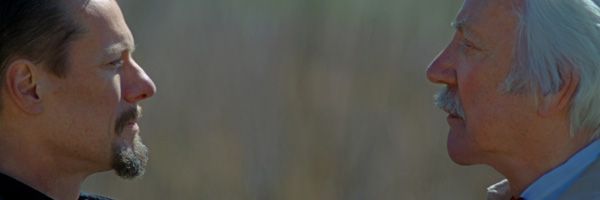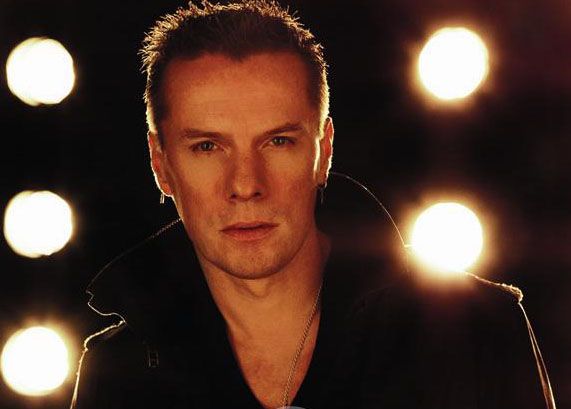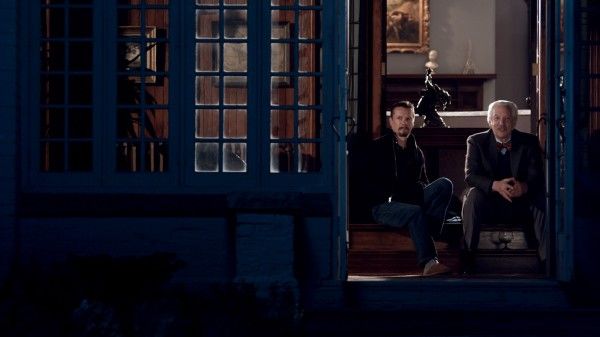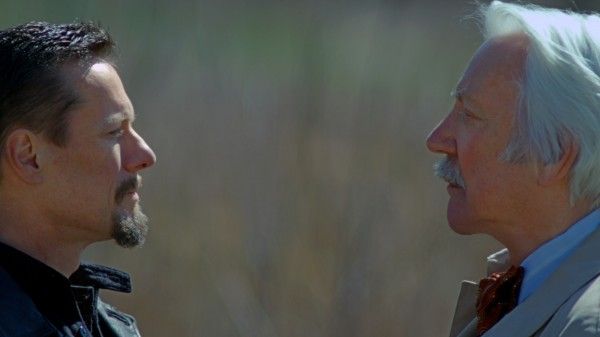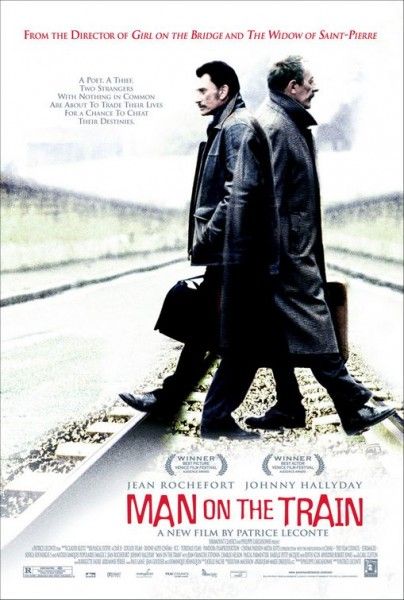Everybody always says that you should never meet your heroes and idols because it could change your opinion of them. So, when it came time to do a phone interview Larry Mullen, Jr. (best known as the drummer of U2) for his acting debut, Man on the Train (available on VOD through December 26th), I was nervous, but not about to pass up the opportunity. Thankfully, I found him to be a great guy, passionate about both life and work, and more gracious and humble than I ever would have imagined.
During this exclusive phone interview with Collider, Larry Mullen, Jr. talked about how his dream of someday trying his hand at acting actually came to fruition, what he learned from working with a veteran like Donald Sutherland, the feeling that he just didn’t want to be embarrassing on film, how nobody, including himself, could have imagined the life that he’s been lucky enough to have, the big issue of agism in the music business, how much he enjoyed being able to score the film (along with musician Simon Clime), and how even though he doesn’t see himself as a career actor, he definitely would like to do it again. Check out what he had to say after the jump:
Here’s the film’s synopsis:
The English-language remake of Patrice Leconte’s award-winning French film of the same name, Man on the Train, directed by Mary McGuckian, is about a mysterious criminal (Larry Mullen, Jr.) who rolls into a small town, planning to knock off the local bank and assuming it will go off without a hitch. But, when he encounters a retired poetry professor (Donald Sutherland), his plans take an unlikely turn. With no place to stay, the professor generously welcomes him into his home. As the two men talk, a bond forms between these two polar opposites, and surprising moments of humor and compassion emerge. As they begin to understand each other more, they each examine the choices they’ve made in their lives, secretly longing to live the type of lifestyle the other man has lived, based on the desire to escape their own.
Question: How did this come about for you? Had you been looking to do an acting role?
LARRY MULLEN, JR.: It was one of those things that, on your day off, you often wonder, “If I had an opportunity, what would I like to do? Would I like to do skydiving, would I like to do some deep sea diving, or maybe some shark diving, or would I like to act?” Basically, I put those things all in the same category. I’ve often thought that it would be great to do some acting because nobody would think that I would be able to do it and it scares the living hell out of me. I had talked about it in those kind of terms. “Oh, yeah, one day, I would love to do that.” People had often said to me, “You should think about doing that. You’d be perfect for it.”
So, I met Mary McGuckian over a drink, a few years ago. She’s an Irish director that I’ve known for a few years. She said, “If you’re ever thinking of doing this, the first stop is to watch this movie, Man on the Train. You have to see Johnny Hallyday and his transition into making a good film. He hasn’t had a terribly successful career, and this is the one for him. He’s really believable. That’s the big issue, isn’t it?” I said, “Yes, it is.” The big issue with rock stars becoming actors is that sometimes it’s not believable, and vice versa with actors becoming rock stars. Sometimes just doesn’t fit. That was a challenge, immediately.
So, Mary went off on her own and secured the rights to the film. She called me about a year and a half later and said, “Remember that film I talked about? I have the rights. Are you interested in doing that?” I said that I was, and we talked about me getting involved in production. I said that I would be interested in playing a cameo role, and she said yes. And then, as things came together, she said, “Look, the whole idea of this is for you to jump in with both feet. It’s not about doing a cameo role. You have to take on the part of The Man.” So, I reluctantly agreed to do it. Six months later, I was on a set with Donald Sutherland. It was like that.
I was surprised at how quickly it came together, and horrified that it had actually come to fruition. It’s easy to say these things. It’s a lot different when you end up on a set in Canada with someone as great as Donald Sutherland. That’s a really terrifying prospect, and it continued to be for 17 very, very interesting days.
You talked about wondering whether you should try acting, but having been such a fan of Elvis Presley and his old movies, was that something that initially inspired you, because he was a musician and an actor, to start wondering about that?
MULLEN: It’s funny you say that because Blue Hawaii was on TV the other night, and I watched it in a very different way than I had watched it before. There’s no doubt that that was part of it, when I saw Elvis acting. He never got a lot of credit for his acting, although I think he was quite a good actor. When I saw Blue Hawaii, I said, “Maybe that’s where it came from,” but it was fanciful. It was never a serious thought, and that’s the truth. I never thought I would do it. It’s that old cliche of, “Be careful what you wish for.” It was a pipe dream.
Mary was pretty clear that she believed I could do it, and I said, “Based on what?” She said, “You’ve got to trust me on that.” I was like, “I can’t trust you, just on that. Where’s the evidence?” She said, “I don’t have any evidence, but you have to trust me,” and I did, which is unusual for me. And, I was lucky that I ended up with someone like Mary. Mary knows the history and she knows that I’ve got no acting experience, and she was prepared to take a chance on that.
It was a huge risk. She had to go to investors and get someone like Donald Sutherland to agree to make the film with somebody like me, who’s never acted before. To this day, I don’t really understand why he agreed to do it. Was it a success for him? Yes, because he’s brilliant. The fact that he agreed to do it with a novice, in the first place, is shocking to me, but I’m so thrilled that he did. A lot of actors wouldn’t want to work with a novice, particularly one who has had a career with that flare. It was a big deal for him, as well.
When you were shooting this, did you have a moment where you really started to feel like an actor?
MULLEN: On the first day, the first scene we shot was the scene in the film where we’re in a field and Donald is shooting at a can. You know the way that movies are shot, but I wasn’t sure how movies were shot. I imagined that, maybe in a film like this, you would start at the beginning and have some kind of sequence. But, of course, there was no sequence, so I was absolutely thrown in the deep end, and with Donald Sutherland. At that stage in the film, I’m no longer the morose guy. I’m starting to like Donald’s character and he’s starting to like me, and we’ve got a bit of banter. After we shot that, I went into the trailer and had a look at the rushes and said, “That’s not bad. I’m not embarrassing.” It was as simple as that. As long as I wasn’t embarrassing, that was good. There were some pieces that we shot where I felt that I didn’t quite nail it, but everybody feels like that. You’re not going to nail it every time.
Overall, it was incredibly difficult. It didn’t come easy, necessarily, but when I looked back at it, I didn’t look as terrified as I actually was. From my day job, everything you do, you have an opportunity to look at and re-asses and change. With this, I could do everything except change it. It was there. It was on film. I couldn’t go back and say, “Sorry, can I redo that bit?” That was, “Oh, shit!,” but also, “Well, it is what it is. I decided to do this and take it on the chin, if it goes wrong.” The fear, in some ways, was what propelled me. I was afraid, and I didn’t want to get it wrong. I wanted to be better, and I was constantly trying to be better, but I wasn’t quite sure what I was trying to be better at. I had no framework. There was nothing for me to bounce back on. It wasn’t like I could call Donald over and say, “Hey, Donald, how was that? Was that okay for you? Should we have had the light this way?” I had no idea. I was wandering around, getting in the way and standing in the wrong places.
It was actually kind of funny, coming from my world where I’m the master of my own destiny, to a certain extent, and then, all of a sudden, I’m not the master of my own destiny. I’m with somebody who is an incredible actor and an incredible guy, and I’m the novice. I’m the one out of my depth. I’m the one who doesn’t really know what he’s doing. It ticked all the boxes, as far as my expectation of what it would be. It was a terrifying experience, but when I was working with Donald, I didn’t feel intimidated by him, necessarily. I just felt out of my comfort zone and out of my depth. Therefore, I had to dig quite deep and rely on instincts that I haven’t used for 25 years. For all those things, it was a truly liberating and extraordinary experience, but it wasn’t easy.
When you think back on all the things that you’ve accomplished in your career, since putting up an ad at school to start a band and having auditions in your living room, could you ever have imagined that it would take you on the journey that it did, and that you would have done all the things that you’ve done?
MULLEN: I don’t think anybody could imagine the life that I’ve been lucky enough to have. It’s been an incredible journey. In my 50th year, to have an opportunity to act, and to act with such a great actor as Donald and with a great director like Mary, is not something that you can imagine. They’re things that you can dream about, but they’re not things that you ever think will become a reality, no.
Do you worry about continuing to be relevant, as a musician, or do you think that you’ll stay relevant, as long as the passion is there?
MULLEN: Relevance is a big, big question. It’s more about what’s your definition of being relevant. In the music world, agism is a big issue. It’s about youth and youth culture. There’s no other art form that I know that requires you to be a certain age. That’s the beauty of this. At 50 years of age, or 49 at the time, I ended up doing something that I dreamt about. Does that makes me relevant? Well, it makes me creative, and that’s important. Relevance, for me, is about being creative and doing things that you believe in, whether that’s music or acting or painting a picture, or whatever that is. Unfortunately, as far as the music is concerned, what defines relevance is whether you are on the radio or whether you are on the cover of a magazine or whether you’re winning MTV awards, and so on and so forth. I don’t believe that that’s beyond U2. I don’t believe that age has got anything to do with it. I think it’s about being creative. There’s no question that the longer you’ve been at this, the more difficult it is. It’s not like being an actor. The longer you’ve been acting, normally, the better you are at it. As a musician, it doesn’t work like that.
Was it fun to have the experience of scoring this film, and have that diversion that’s different from what you’re used to doing?
MULLEN: Oh, there’s no question about that. Even being involved in the production was just amazing. It was just great to be somewhere that I was having conversations that I wouldn’t normally have. I was involved in business decisions that I wouldn’t normally be involved in. With regard to the score, to be with a musician (Simon Clime) who has a very different way of doing things and to have to fall into somebody else’s pattern was challenging, but it was a really good experience. I enjoyed the whole process, very much. The acting part was definitely the most difficult thing.
Having had this experience, did it inspire you to want to try acting again?
MULLEN: Oh, no question. When you’ve done this once, and when you’ve crossed the threshold, the fear is intoxicating. I would really love to do it again. The thing that benefitted me the most, in this role, was the lack of training and the lack of craft. That really benefitted me, in this situation. I’m not sure, for every other role, that it would be as beneficial. So, I would definitely like to do it again. I would love the opportunity to do it again. It won’t be down to me, necessarily. It will be done to a director or a casting director taking a chance on a novice, and that’s what I am.
I will never be a career actor, I don’t think. I don’t feel that I have the skill set to jump into it that way, although I wouldn’t mind giving it a try. The only thing I wouldn’t like to do now is to play roles as a musician. I’m not sure that I would be comfortable doing that, and I’m not sure I’d be very good at it. I think I would be better served, and would be a better partner, if I was in something outside of myself. That was what was interesting about this. At times, when I had to play the role, I was way outside of myself, and I found that comfortable, in an odd way.

